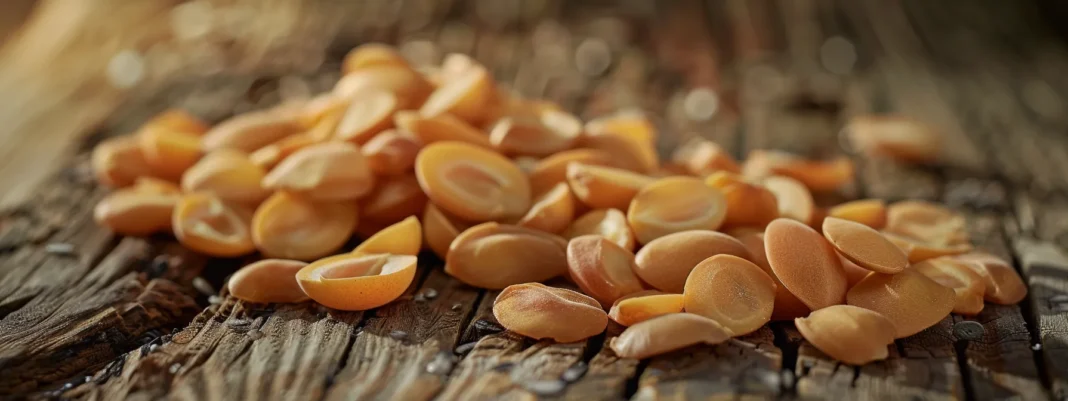Regarding superfoods, apricot seeds might not be the first thing that comes to mind. Yet these small kernels pack a powerful punch regarding nutrition and health benefits. From their potential to fight cancerous cells to their ability to boost heart health, apricot seeds are gaining recognition among health enthusiasts. In this article, we’ll explore the advantages of incorporating apricot seeds into your diet.
Exploring the Nutritional Profile of Apricot Seeds

Apricot seeds, also known as kernels, are rich in essential nutrients. They contain significant protein, dietary fiber, potassium, magnesium, and iron minerals. The high protein content makes them a great snack for those looking to increase their protein intake without relying on meat or dairy products.
These kernels are also loaded with healthy fats, primarily monounsaturated fats, vital for maintaining good cholesterol levels. In addition to fats and proteins, apricot seeds offer an array of B vitamins, particularly B17, which is rare in modern diets and associated with cancer prevention. Vitamin E also adds to their nutritional repertoire, providing antioxidants that are excellent for skin health.
Zinc availability in apricot seeds shouldn’t be overlooked; an essential trace element bolsters the immune system. The comprehensive nutritional profile of apricot seeds is impressive, making them valuable to a balanced diet. You can also buy apricot seeds online to start reaping their benefits immediately.
The Cancer-Fighting Potential of Amygdalin in Apricot Seeds
One of the most intriguing components of apricot seeds is amygdalin, also known as vitamin B17. Amygdalin has been central to much research due to its potential cancer-fighting properties. This compound can release cyanide when it comes into contact with cancerous cells, causing a toxic reaction that targets and destroys the malignant cells without harming healthy ones.
It is important to note that the use of amygdalin in cancer therapy is subject to ongoing debate and research. While some pilot studies have shown promising results, proper dosage and safety are still areas of concern in mainstream medicine. However, the anecdotal evidence and historical use of apricot seeds in traditional treatments continue to drive interest in this area.
Critics argue that because amygdalin can release cyanide, there is a risk of poisoning if consumed in large quantities. However, proponents of natural cancer treatments suggest that the risks can be mitigated with proper dosage control. They look at the traditional usage of apricot seeds in certain cultures with anecdotal evidence of lower cancer rates.
Apricot Seeds and Heart Health: A Natural Way To Reduce Cholesterol

The healthy fats found in apricot seeds are important for general wellness and have particular benefits for heart health. The monounsaturated and polyunsaturated fats in these seeds can contribute to lowering bad LDL cholesterol while promoting good HDL cholesterol levels. This balance is crucial in reducing the risk of heart disease and stroke.
The fiber content in apricot seeds also plays a significant role in heart health. Soluble fiber is known to assist in reducing blood cholesterol levels by interfering with the absorption of dietary cholesterol in the intestines. Regular consumption of apricot kernels can contribute to maintaining a healthy cardiovascular system.
In addition to fiber and healthy fats, apricot seeds contain antioxidants that protect the arteries from oxidative stress and inflammation. These damaging processes can lead to atherosclerosis, a condition where plaques build up in the arterial walls and can cause heart attacks. Antioxidants help to mitigate this risk by neutralizing harmful free radicals.
The Role of Apricot Seeds in Traditional Medicine and Modern Diets

Historically, apricot seeds have been used in various traditional medicine practices worldwide. In Chinese medicine, for example, they have been used to treat respiratory conditions like coughs and asthma, reflecting their anti-inflammatory properties. Their use in traditional medicine indicates a recognition of their remedial potential long before modern nutritional science.
In modern diets, as people become more interested in holistic and preventive health, aprcot seeds are re-emerging as a superfood. Their nutrient-dense profile, including compounds like amygdalin and numerous antioxidants, aligns well with current nutritional trends emphasizing whole foods and plant-based ingredients.
The accessibility of apricot seds in health food stores and online platforms has further facilitated their integration into daily dietary regimens. They can be eaten raw, ground into a powder to add to smoothies, or even used in baking and cooking. Their versatility allows for their incorporation into sweet and savory dishes, making it easy for individuals to reap their health benefits in varied and enjoyable ways.
Overall, apricot sees are a rich source of nutrients and compounds with potential health benefits spanning cancer prevention and immune system support. While the controversy surrounding some of their components, like amygdalin, continues, many health-conscious individuals find value in these kernels as a food supplement and in traditional medicine.


